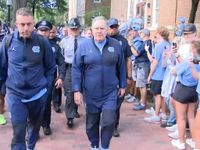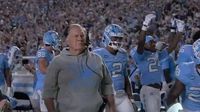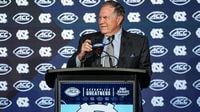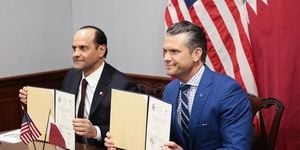The buzz in Chapel Hill was palpable as Bill Belichick, the legendary six-time Super Bowl-winning coach, made his highly anticipated debut as North Carolina’s head football coach. The Tar Heels’ Week 1 home clash against TCU on September 1, 2025, was more than just a game—it was the start of a bold new era for UNC football, one that had been hyped for months and scrutinized by fans, alumni, and the national media alike. The scene at Kenan Memorial Stadium was electric, with UNC icons like Michael Jordan, Lawrence Taylor, and Roy Williams in attendance, all eager to witness history in the making.
UNC wasted no time igniting the crowd. Running back Caleb Hood opened the game with a 9-yard run, setting the tone for a methodical 83-yard drive that he capped off with an 8-yard touchdown. The stadium erupted as the Tar Heels took a 7-0 lead, and for a fleeting moment, it seemed the Belichick era was off to a dream start. But as quickly as hope surged, the reality of college football’s unforgiving nature set in. TCU responded with a relentless onslaught, and by halftime, the Horned Frogs had seized control with a 20-7 lead.
The second half began with a gut punch for UNC. TCU’s Kevorian Barnes ripped off a 75-yard touchdown run on the very first play of the third quarter, sending a clear message that the visitors had no intention of letting up. The nightmare continued for the Tar Heels when quarterback Gio Lopez, who had transferred from South Alabama and won the starting job in preseason, was sacked by TCU’s Jonathan Bax. The hit forced a fumble, which Devean Deal scooped up and returned 37 yards for a touchdown, ballooning TCU’s lead to a staggering 41-7. Lopez, shaken and possibly injured, exited the game, and the crowd’s anticipation gave way to concern and disappointment.
Max Johnson, who had started for UNC in 2024 before suffering a devastating leg injury that required five surgeries, was thrust back into action. Johnson’s resilience shone through as he engineered a scoring drive, culminating in a touchdown pass to his brother, tight end Jake Johnson. It was a bright spot in an otherwise lopsided affair, but by then, many fans had already begun filing out of Kenan Stadium, the reality of a 48-14 defeat settling in. The Belichick era, which began with so much promise, had stumbled out of the gate in dramatic fashion.
But the story of Belichick’s first game is only a chapter in a much larger narrative that has enveloped North Carolina football since his surprise hiring in December 2024. From the moment he arrived, Belichick set an ambitious tone, telling his new team, "We’re going to grind every single day. It’s a process from January until the season starts," according to veteran quarterback Max Johnson. The process, however, has been anything but smooth. The offseason was marked by chaos and upheaval, as Belichick and his handpicked staff overhauled the roster and recruiting operations. In total, 39 players transferred out after his arrival, including nearly two dozen following spring workouts. UNC aggressively targeted the transfer portal, adding 23 new players in the spring window—a move that drew both praise and criticism from rival coaches and insiders.
Belichick’s approach to recruiting was described by many as frenetic and businesslike. He cut much of the previous staff in an effort to "go lean," but the result was a skeleton crew that struggled to keep pace with NCAA rules and basic recruiting logistics. "It was very stressful," a former staff member admitted. "Everyone was running around like chickens with their heads cut off." There were tales of recruits waiting for hours only to miss face time with the coach, and compliance reminders about recruiting quiet periods and NIL restrictions became a regular occurrence. Yet, for all the initial missteps, Belichick’s national reputation and NFL pedigree began to pay dividends. By the summer of 2025, UNC had secured nine blue-chip commitments for the 2026 class, and Belichick’s hands-on approach was winning over prospects and their families.
High-profile recruiting visits became the norm, with Belichick personally traveling to meet top targets like the Griffin-Haynes brothers at Rolesville High. "He wants me to be the face of the program, but he also said I have to work for it. He’s not just going to hand it to me," Zavion Griffin-Haynes recalled. Belichick’s detailed plans, film study sessions, and NFL preparation pitches resonated with recruits and high school coaches alike. Andy Capone, coach at Weddington (N.C.), was struck by Belichick’s ability to relate plays from recruits’ high school games to those run by NFL greats like Lawrence Taylor and Mike Vrabel. "It was really cool to let them see a perspective of how he sees players in his system," Capone said.
Off the field, Belichick’s presence brought both excitement and controversy. His relationship with girlfriend Jordon Hudson, nearly 50 years his junior, became a lightning rod for media attention and internal debate at UNC. Emails obtained by ESPN revealed Hudson’s early involvement in the football program’s communications and PR, a move that ruffled feathers among longtime staff and prompted complaints from fans and donors. Yet, as the spring wore on, Hudson’s role was scaled back, with UNC’s administration clarifying that she was not involved in recruiting or football operations, but continued to assist with scheduling and a documentary project chronicling Belichick’s first season.
Security and access around the football program tightened considerably, with nonessential personnel barred from facilities and facial recognition systems installed. Belichick’s staff, filled with trusted NFL confidants and family members, monitored internal communications to prevent leaks. Yet, inside the building, Belichick was described as personable and accessible, breaking down film with players and holding court at team events. Athletic director Bubba Cunningham, initially skeptical of the hire, admitted, "It’s a different model. They wanted to bring in their own coaches and personnel and recruiting people, people they’ve worked with previously. It’s a very personable staff."
Belichick’s impact extended into the broader UNC community. He delivered pizza to fraternities, sororities, and other sports teams, and asked for lacrosse lines to be painted on the practice field, underscoring his appreciation for college athletics. Donations surged, season tickets sold out, and new premium seating options were added as excitement reached unprecedented heights. "The pitch has changed because the excitement’s never been higher," said Rick Barakat, UNC’s chief revenue officer. Even rival programs felt the "Belichick Bump," with Charlotte 49ers’ ticket sales spiking ahead of their Week 2 matchup with UNC.
Belichick has made it clear that his systems—on offense, defense, and special teams—are rooted in NFL fundamentals. "Fundamentals and techniques that go with them are based on that too, practice, structure, meeting, installation, teaching. There were some modifications we had to make, but basically it’s all the same," Belichick explained. Players and coaches alike have noted his adaptability and growing comfort with the college game. "He understands that he had to change his way of doing things, and he’s doing that, and he’s really adapting to this new culture," said Rolesville coach Ranier Rackley.
Despite the rocky debut, optimism remains high in Chapel Hill. Belichick promised, "We’re going to win national championships here," and while the first test ended in disappointment, the foundation for a new era has been laid. The spotlight is firmly on UNC, and with Belichick at the helm, the journey promises to be anything but dull. As the Tar Heels regroup and prepare for the rest of the season, one thing is certain: North Carolina football is once again the talk of the nation.






